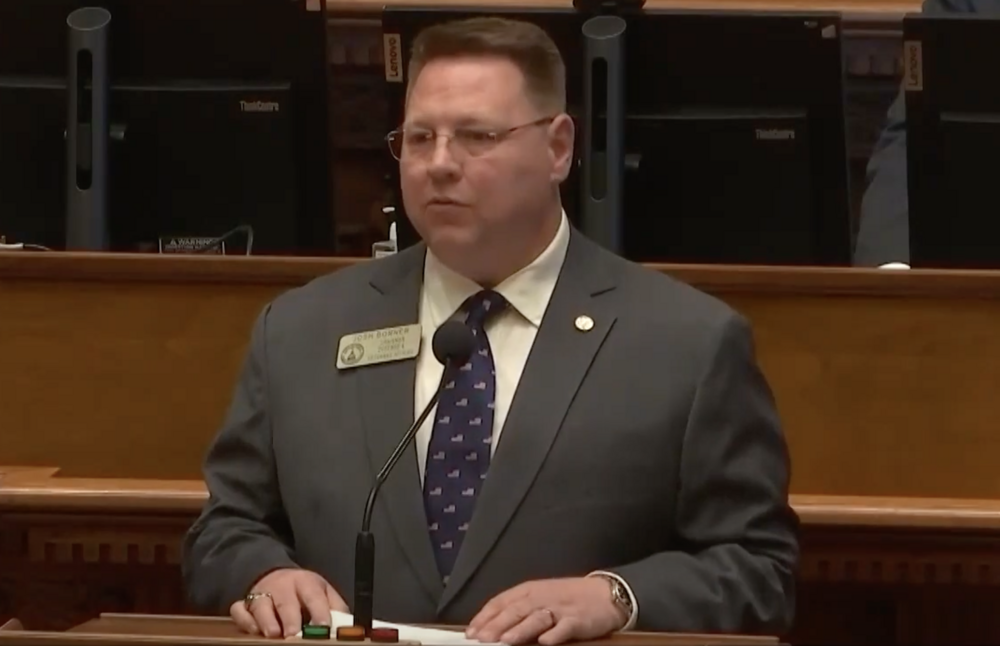
Caption
Rep. Josh Bonner (D-Fayetteville) presenting Senate Bill 1 on the Senate floor on Monday, March 31, 2025, which was ban transgender athletes from girl sports.
Credit: Screenshot

Rep. Josh Bonner (D-Fayetteville) presenting Senate Bill 1 on the Senate floor on Monday, March 31, 2025, which was ban transgender athletes from girl sports.
On Monday at the Capitol, both chambers took up dozens of bills on the first day of the last week of the session.
The Senate took on 27 House bills on the rules calendar, most notably House Bill 268, which increases school safety.
Before the bill's presentation, Sen. Bill Cowsert (R-Athens) read the names of Apalachee High School shooting victims and asked for a moment of silence.
The bill sets up a variety of new elementary and secondary school safeguards and protocols, including school mapping for first responders, transferring a student's academic and legal records among schools and law enforcement within a required period, and creating a statewide emergency alert system.
A database of student misconduct proposed in the House's original version was removed because of parents' concerns.
"Parents kept coming and being heard saying, 'I don't think I want my child to be persecuted for life 'because they do something stupid in the eighth grade and they say, 'Man, I'd like to blow this building up,'" Cowsert said. "That ain't good to say, but that doesn't mean they're gonna do it.
"And if the school faculty didn't think it was significant enough or serious enough to give them disciplinary action and create a record, why should we have this shadow database, so to speak, on misconduct of students?"
Democrats wanted to add language that would take children with certain cognitive limitations into consideration, but that amendment failed.
The bill was passed 45 to 9.
After years of effort, 33 Black legislators — elected in 1868 during Reconstruction and some of the first African American legislators elected in the U.S. — will finally be recognized at the Capitol.
HB 303 will place a memorial on Capitol grounds honoring the men.
"Simply honoring their sacrifice that they made back then when they went up against all odds," Sen. Matt Brass (R-Newnan) said.
Also on Monday, the Senate insisted on its version of the fiscal year 2026 budget after the House rejected the Senate's changes.
A conference committee with the House was then agreed upon to hammer out the chambers' differences to finalize the budget by Friday. It's the one piece of legislation constitutionally required to pass each session.
In the House, members unanimously passed Senate Bill 93 or the Georgia Early Literacy Act. The bill would create new guidelines for teaching reading to young students by banning the three-cueing system.
"This ensures Georgia teachers are being trained in alignment with our science of reading standards," Rep. Bethany Ballard (R-Warner Robins) said. "It works to strengthen our efforts to end the reliance on the three-cueing practice. And it supports our teachers by making sure they are ready to teach reading to our children on day one in the classroom."
After lunch, the House took up one of the most contentious bills of the session, Senate Bill 1.
SB 1 would ban transgender girls from participating in girls' sports and require changing rooms to be separated by sex assigned at birth.
Democrats were quick to oppose the bill.
"This is a manufactured crisis, designed not to solve a real problem but to create division and fear," Rep. Karla Drenner (D-Avondale Estates) said.
"The NCAA has changed its policy on transgender athletes," Rep. Karen Lupton (D-Chamblee) said. "The IOC has rules in place that deal with transgender athletes, the Georgia High School Association has rules that deal with transgender athlete. I question why we must double down and triple down. They have not asked us for this."
But Republicans say it protects the integrity of female sports.
"This legislation does not target individuals; it targets inequities," Rep. Chris Erwin (R-Homer) said. "It safeguards the decades of progress made in women's athletics by reaffirming the state's interest in promoting equal opportunity and preventing unfair advantages.
"The bill also respects privacy by ensuring that shared facilities used during competitions such as locker rooms, restrooms, and sleeping quarters are designated and used according to biological sex, while still offering reasonable accommodations for all students," he added. "It prohibits males from competing in female sports, thereby protecting the competitive balance, and physical safety that women's sports depend upon."
The bill passed 100 to 64 and was immediately transmitted to the Senate.
The House took up another controversial school-related bill, SB 82.
The bill would create financial incentives for local school boards to approve petitions for new charter schools and penalize school systems that repeatedly deny charter school proposals that have been approved by the State Charter School Commission.
Supporters say SB 82 expands options for students.
"What this bill does is — simply, it's a very modest proposal to encourage local school boards to provide more public-school options to students," Rep. Jan Jones (R-Milton) said.
But opponents say that the bill is taxing on local education systems.
"Not only does it usurp their elected responsibilities, but it pressures them to approve charter school applications and lays the groundwork for increased privatization of all of our public schools," Lisa Campbell (D-Kennesaw) said.
The bill passed 107 to 62 in a mostly party-line vote.
Committees meet Tuesday, but the House and Senate floor sessions will be back on Wednesday.